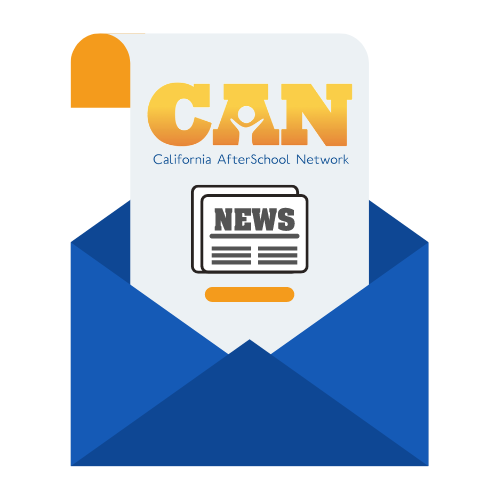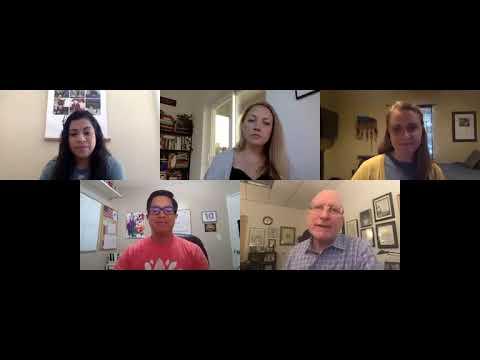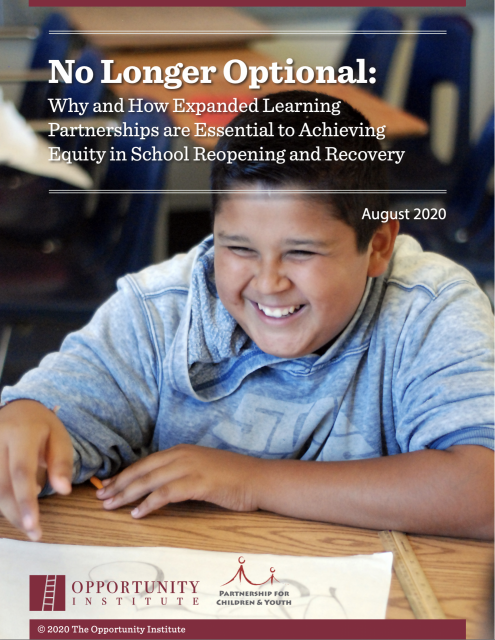CAN Newsletter – Returning to School Safely
August 13, 2020
Exactly 5 months ago today many of us we entered into lockdown. Today, across the state, schools, expanded learning programs, students, families, and communities are busy preparing for the next school year and in fact, many have started this week (if not earlier). 2020 has certainly been a year unlike any other and this upcoming school year will be an unprecedented one as well.
As many as 96 percent of our state’s students will begin this academic year in distance learning—and the need to ensure all of them have the basic technology to access grows increasingly urgent. A few weeks ago CDE released the first set of answers to Frequently Asked Questions regarding distance learning, which are designed to help school districts better understand new state requirements for live instruction, daily participation, and steps for re-engagement when students have not connected with their schools. Last week CDE convened a special meeting of the Closing the Digital Divide Task Force and announced a new partnership with Apple and T-Mobile to connect up to a million students in need.
Further, as schools begin to reopen in the midst of uncertainty and current events, the question of how to return to school safely is on every educator’s mind. Teaching Tolerance has resources on how educators can facilitate discussions on racism and police violence, as well as how to support students through COVID-19 and how to routinely practice self-care.
These are challenging times. Don’t hesitate to reach out to our team so that we know the best ways to support you in the weeks and months ahead. Below and throughout the newsletter, you will find more resources that may help you in this upcoming school year.
Back to School Resources & Readings, Curated by National Equity Project
- Abolitionist Teaching and the Future of our Schools
- Back to School Like Never Before: The BELE Network’s guide to centering students, equity, and SEL in the Fall
- The Multiple Fallacies of Reopening School
- How Students Benefit from a School Reopening Plan Designed for Those at the Margins
- Is Unschooling the Way to Decolonize Education?
- What If We… Don’t Return to School As Usual
- What Anti-racist Teachers Do Differently
- Leading Through the Portal to Reclaim Our Humanity
ASCD
Reopening Resources
When schools reopen, educators should focus less on what students
know and more on the success skills students need.
- If We Aren’t Addressing Racism, We Aren’t Addressing Trauma - Educators must address systemic racism in order to truly address trauma.
- A Positive Classroom Climate, Even from a Distance - Small gestures of connection may be more challenging to replicate in the online environment, but that doesn’t mean educators can’t still create a caring community with students during remote learning hours.
- How Leadership Principles Can Relieve Trauma - Small gestures of connection may be more challenging to replicate in the online environment, but that doesn’t mean educators can’t still create a caring community with students during remote learning hours.
In This Newsletter:
Important CDE Updates
August 2020
COVID-19 Frequently Asked Questions
The Expanded Learning Division (EXLD) has posted some Frequently Asked Questions to the California Department of Education’s Expanded Learning Programs web page.
The EXLD will continue to add to this as needed. If you have any questions about this information please contact your Regional Consultant or Fiscal Analyst. Regional contact information can also be found on the CDE web page.
Expanded Learning Federal Program Monitoring for Fiscal Year 2020–21
Important update from the California Department of Education Expanded Learning Division (EXLD) regarding the waiving of certain California Education Code sections for the Fiscal Year 2020-21 due to the COVID-19 Pandemic, Senate Bill 98, and Statutes of 2020:
Expanded Learning in CA: Fostering Success Among High-Need Students
The California Department of Education’s Expanded Learning Division is pleased to announce that the Expanded Learning in California: Fostering Success Among High-Need Students—2017 Executive Brief has been posted on CDE webpage.
This brief contains important information regarding the Findings and other information that was included in the Statewide Evaluation—“Characteristics of Schools and Students Participating in After School Program 2017 Report” that was posted in December 2019.
Update on CDE EXLD FAQs & Interview with Woodcraft Rangers
Fireside Chat: Aug 10, 2020
The California AfterSchool Network is hosting weekly interviews with Michael Funk, Division Director for the California Department of Education Expanded Learning Division (EXLD).
In the 15th Fireside Chat we discuss the recently posted FAQs from the EXLD in light of the release of Governor Gavin Newsom’s Pandemic Plan for Learning and Safe Schools.
This week we are also excited to be joined by the team at Woodcraft Rangers. We are joined by Julee Brooks – Chief Executive Officer, Danny Salas – Director of Expanded Learning, and Helen Santos – Director of Digital Learning. They share with us how they have built connections and engagement with family, their ever-improving quality virtual engagement opportunities with students, and how they are supporting staff while addressing health and safety issues. Learn more about Woodcraft Rangers: https://woodcraftrangers.org
No Longer Optional: Expanded Learning in School Reopening
Why and How Expanded Learning Partnerships are Essential to Achieving Equity in School Reopening and Recovery
Reopening schools in this chaotic environment in ways that center equity will unquestionably require an all-hands-on-deck approach. The massive task schools have in front of them is far beyond the capacity and resources they have at their disposal, and the systems of support they typically rely on are just as strained.
Afterschool Alliance Releases Blueprint: How Afterschool Programs & Community Partners Can Help Schools Reopen
The Blueprint outlines considerations that local communities are currently discussing and provides five essential building blocks that together can help ensure that students have access to a multitude of learning settings and trusted adults — all operating with a shared vision – to help support the social, emotional, and academic learning of all young people.
Social Emotional Learning and School Reopenings: A Guide for Schools
Schools are trying to plan for the upcoming academic year during a pandemic, economic recession, and national protests over police killings of Black Americans. Explore EdWeek’s guide and the roadmap developed by the Collaborative for Academic, Social, and Emotional Learning, or CASEL, and 40 other education groups that lays out what schools need to do to respond comprehensively to the challenges that students are facing.
Universal Meals for Students
The COVID-19 pandemic has been devastating for many, but school-aged children have been especially impacted through school closings, a transition to virtual learning, and for many, a disruption in how they eat. You can help children throughout the country by contacting Congress in support of child nutrition programs. By contacting Congress, you can help make sure that kids who have been impacted by the pandemic can continue to have access to nutritious food during the next school year.
Resource Center: Social Emotional Learning and School Reopenings
Check out these new Social Emotional Learning and School Re-Opening resources to for back to school during a pandemic. Don’t forget to visit the CAN COVID-19 Resource Center for additional topics and resources:
Creating an Engaging & Restorative Environment to Support Transitions to School
Wednesday, August 19, 2020; 11:00 a.m.–12:30 p.m.
The start of the 2020-21 school year will be unprecedented due to social distancing, interrupted learning, and the loss of routine experienced by every member of the school community. How can districts and schools create caring and supportive school environments, in the midst of uncertainty, that encourage students and families to attend and participate in school?
Join this Attendance Awareness Campaign webinar to examine what it means to address the effects of trauma while helping to reestablish the routine of school, whether it is in-person, remote, or a blend. Hear about what families need from schools and educators who have supported their communities through traumatic events.
Promoting Youth Wellness: OST Roundtable
Thursday, August 20, 2020; 11:00 AM
As educators and school districts prepare for the outcomes of their many efforts to design and re-design safe spaces for young people in the age of COVID-19, it is critical to guard against the challenges that could threaten healthy young adjustment, growth, and wellness. How can educators create supportive and healing spaces for young people in this unique moment in time, whether that be in-person or virtual? What does back to school look like and can you prepare amidst the unknowns?
Join CalSAC for their Youth Wellness Roundtable to explore answers to those questions! Complimentary Registration!
Upcoming Webinar: Heartset® Education – A Compassionate Model for Culture Change
Wednesday, September 16, 2020; 10:00 AM
The How Kids Learn Foundation, Temescal Associates, and EduCare Foundation will be providing a free, and highly interactive webinar in September.
Explore EduCare’s 8 Skills for Heartset® Education that focus on deepening our empathy for ourselves and others while assisting us in how to turn current challenges into learning opportunities. Partake in proven SEL practices that center around bringing human connection inside our digital connection.
Keep Up The Story of How COVID-19 is Affecting Afterschool and Summer Programs
Throughout June, the Afterschool Alliance asked you to share your story of how COVID-19 has impacted afterschool and summer programs and the young people and families who rely on them to keep kids safe and engaged in learning.
Worker Protections During COVID-19
To help ensure that California workers and their employers understand new workplace restrictions as our state continues to try to limit the spread of COVID-19, InformaGente has released an online interview with California’s Secretary of Labor and Workforce Development Agency Julie A. Su discusses workers’ rights and safety issues with actor Rául Castillo and Labor Commissioner Lilia García Brower.
Diversity, Equity, and Inclusion in Out-of-School Time Programs
ChildTrends highlights strategies that local YMCAs use to support diversity, equity, and inclusion (DEI) in their programming in their new research. These strategies can help inform other out-of-school time programs working to become more equitable.
Get Counted for the 2020 Census!
There are still a couple months left to be counted for the Census! The California Complete Count – Census 2020 Office estimates that for every person not counted, California could lose $1,000 in funds a year for ten years. As of July 27th 2020, the Census response rate was 63.9% which is amazing progress especially during a once-in-a-century pandemic!
Let’s continue to keep the momentum going and get counted!
Learning in Afterschool and Back to School Resources
Check out the most recent blogs from LIAS!
- Re-opening: The Big Picture & Practical Realities for Afterschool
- Afterschool Provider Survey Results: Afterschool in the Time of COVID-19
- The Art of Distance Learning in Afterschool
- Re-opening Programs and More
- Practice Q&A: Distance Learning with High School Youth
- The Statewide Network for New Jersey’s Afterschool Communities Virtual Afterschool Resource Guide
Check out CAN’s Other Newsletters!
Access the CAN newsletter archives to view past newsletters today! You may be interested in some of our other newsletters as well:
CAN Policy Newsletters
- Get informed about state and federal afterschool updates!
- Subscribe today!
CAN Health and Wellness Newsletters
- Get informed on the connections between afterschool and Whole Child Health and Wellness newsletter!
- Sign up to receive the newsletter today!




















